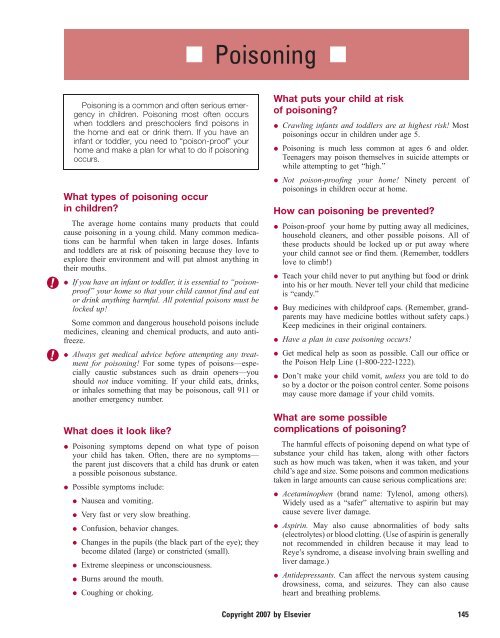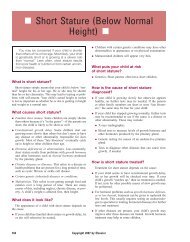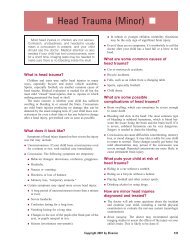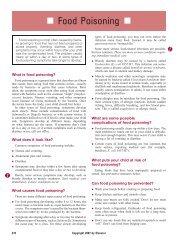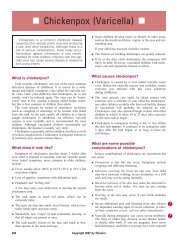Poisoning - Impcna.com
Poisoning - Impcna.com
Poisoning - Impcna.com
You also want an ePaper? Increase the reach of your titles
YUMPU automatically turns print PDFs into web optimized ePapers that Google loves.
n <strong>Poisoning</strong> n<br />
!<br />
!<br />
<strong>Poisoning</strong> is a <strong>com</strong>mon and often serious emergency<br />
in children. <strong>Poisoning</strong> most often occurs<br />
when toddlers and preschoolers find poisons in<br />
the home and eat or drink them. If you have an<br />
infant or toddler, you need to “poison-proof” your<br />
home and make a plan for what to do if poisoning<br />
occurs.<br />
What types of poisoning occur<br />
in children<br />
The average home contains many products that could<br />
cause poisoning in a young child. Many <strong>com</strong>mon medications<br />
can be harmful when taken in large doses. Infants<br />
and toddlers are at risk of poisoning because they love to<br />
explore their environment and will put almost anything in<br />
their mouths.<br />
If you have an infant or toddler, it is essential to “poisonproof”<br />
your home so that your child cannot find and eat<br />
or drink anything harmful. All potential poisons must be<br />
locked up!<br />
Some <strong>com</strong>mon and dangerous household poisons include<br />
medicines, cleaning and chemical products, and auto antifreeze.<br />
<br />
Always get medical advice before attempting any treatment<br />
for poisoning! For some types of poisons—especially<br />
caustic substances such as drain openers—you<br />
should not induce vomiting. If your child eats, drinks,<br />
or inhales something that may be poisonous, call 911 or<br />
another emergency number.<br />
What does it look like<br />
<strong>Poisoning</strong> symptoms depend on what type of poison<br />
your child has taken. Often, there are no symptoms—<br />
the parent just discovers that a child has drunk or eaten<br />
a possible poisonous substance.<br />
Possible symptoms include:<br />
Nausea and vomiting.<br />
Very fast or very slow breathing.<br />
Confusion, behavior changes.<br />
Changes in the pupils (the black part of the eye); they<br />
be<strong>com</strong>e dilated (large) or constricted (small).<br />
Extreme sleepiness or unconsciousness.<br />
Burns around the mouth.<br />
Coughing or choking.<br />
What puts your child at risk<br />
of poisoning<br />
Crawling infants and toddlers are at highest risk! Most<br />
poisonings occur in children under age 5.<br />
<strong>Poisoning</strong> is much less <strong>com</strong>mon at ages 6 and older.<br />
Teenagers may poison themselves in suicide attempts or<br />
while attempting to get “high.”<br />
Not poison-proofing your home! Ninety percent of<br />
poisonings in children occur at home.<br />
How can poisoning be prevented<br />
Poison-proof your home by putting away all medicines,<br />
household cleaners, and other possible poisons. All of<br />
these products should be locked up or put away where<br />
your child cannot see or find them. (Remember, toddlers<br />
love to climb!)<br />
Teach your child never to put anything but food or drink<br />
into his or her mouth. Never tell your child that medicine<br />
is “candy.”<br />
Buy medicines with childproof caps. (Remember, grandparents<br />
may have medicine bottles without safety caps.)<br />
Keep medicines in their original containers.<br />
Have a plan in case poisoning occurs!<br />
Get medical help as soon as possible. Call our office or<br />
the Poison Help Line (1-800-222-1222).<br />
Don’t make your child vomit, unless you are told to do<br />
so by a doctor or the poison control center. Some poisons<br />
may cause more damage if your child vomits.<br />
What are some possible<br />
<strong>com</strong>plications of poisoning<br />
The harmful effects of poisoning depend on what type of<br />
substance your child has taken, along with other factors<br />
such as how much was taken, when it was taken, and your<br />
child’s age and size. Some poisons and <strong>com</strong>mon medications<br />
taken in large amounts can cause serious <strong>com</strong>plications are:<br />
Acetaminophen (brand name: Tylenol, among others).<br />
Widely used as a “safer” alternative to aspirin but may<br />
cause severe liver damage.<br />
Aspirin. May also cause abnormalities of body salts<br />
(electrolytes) or blood clotting. (Use of aspirin is generally<br />
not re<strong>com</strong>mended in children because it may lead to<br />
Reye’s syndrome, a disease involving brain swelling and<br />
liver damage.)<br />
Antidepressants. Can affect the nervous system causing<br />
drowsiness, <strong>com</strong>a, and seizures. They can also cause<br />
heart and breathing problems.<br />
Copyright 2007 by Elsevier 145
146 n <strong>Poisoning</strong><br />
!<br />
!<br />
Clonidine. Sometimes used for attention deficit–hyperactivity<br />
disorder (ADHD) treatment. Dangerous poisoning<br />
can occur at relatively low doses, causing breathing<br />
problems and <strong>com</strong>a.<br />
Corrosive products (for example, drain openers, bleach,<br />
or any kind of acid). Can seriously damage the esophagus<br />
(swallowing tube), skin, or eyes. Do not induce<br />
vomiting!<br />
Antifreeze (ethylene glycol). A <strong>com</strong>mon cause of poisoning<br />
because it tastes sweet. Causes organ failure if not<br />
treated, including seizures, kidney failure, and <strong>com</strong>a.<br />
Insecticides (organophosphates or carbamates). Can<br />
cause nervous system damage.<br />
Hydrocarbons (such as refrigerants). Can cause lung<br />
damage if inhaled.<br />
Plants. Many house plants and wild plants are potentially<br />
toxic.<br />
How is poisoning treated<br />
If you think your child may have been poisoned, get<br />
medical help immediately. Call your regional poison control<br />
center (1-800-222-1222), or call 911. Don’t wait for symptoms<br />
to occur. Be prepared to provide as much information<br />
as possible about the substance your child was exposed to.<br />
For swallowed poisons, do not give syrup of ipecac or<br />
anything else to induce vomiting unless instructed to do<br />
so by the poison control center or a doctor.<br />
For inhaled poisons, get the child to fresh air as soon as<br />
possible.<br />
If poison has gotten on the skin or in the eyes, rinse with<br />
lots of fresh water for several minutes.<br />
Home treatment: Your child may be managed at home,<br />
depending on the dangers of whatever he or she was<br />
exposed to. For example, although some kinds of medicines<br />
are very dangerous, others are unlikely to cause serious poisoning.<br />
If your child is managed at home, you’ll be given<br />
specific instructions on when to seek emergency medical<br />
care.<br />
If your child develops new or unexpected symptoms, get<br />
medical advice immediately.<br />
Hospital treatment: If your child has been exposed to a<br />
dangerous poison or has overdosed on certain medicines,<br />
he or she will need to go to the hospital. There he or she<br />
may undergo various types of treatment, including:<br />
Activated charcoal may be given to absorb the poison<br />
from your child’s stomach. This may be given as a<br />
“slurry” drink or placed in your child’s stomach through<br />
a nasogastric (NG) tube. This is a small tube placed<br />
down the nose and into the stomach.<br />
The NG tube may be used to remove the poison from<br />
your child’s stomach. This is called gastric lavage, or<br />
stomach pumping.<br />
Treatments to help eliminate the poison. For certain poisons,<br />
a treatment called dialysis may be used to filter the<br />
poison from the blood.<br />
Blood tests. Blood and urine tests may be performed to<br />
measure the amount of poison in your child’s body and<br />
how it is affecting the organs and blood salt (electrolyte)<br />
levels.<br />
Supportive care. Other treatments may be needed to support<br />
your child while the poison is eliminated. If breathing<br />
is severely affected, your child may need to be<br />
connected to a machine to help with breathing (mechanical<br />
ventilation).<br />
If the poisoning was part of a suicide attempt, psychiatric<br />
care may be needed.<br />
When should I call your office<br />
Call the regional poison control center (1-800-222-1222)<br />
any time you think your child may have drunk or swallowed<br />
any type of poison.<br />
!<br />
Copyright 2007 by Elsevier


